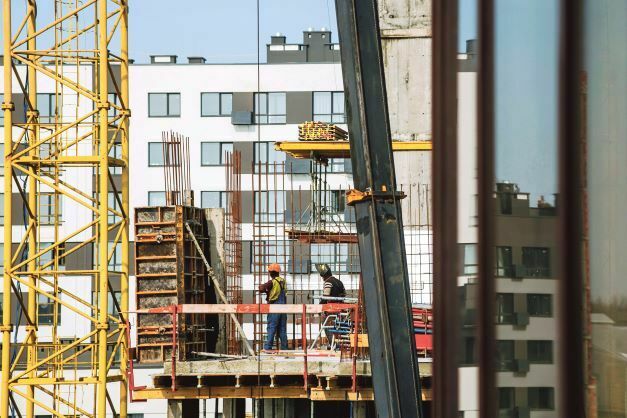How does the war in Ukraine affect the real estate market?
If we look around, most of what surrounds us is “real estate” or space indirectly related to it. No wonder then that this space has such an enormous impact on our private, social, political and economic life.
It is estimated that Warsaw takes up 10-12% of the value of all investments nationwide, although the total impact of materials and construction services added on makes 20.3% of GDP and almost 2.6 million jobs. This means that 1/5 of the labor market in Poland is people connected directly or indirectly with construction. From a budgetary point of view, the industry accounts for 11-12% of annual revenues for the public finance sector.
The war in Ukraine has had a big impact on the economy and the functioning of the construction industry, a key part of which is the housing sector. The supply chains of materials from eastern markets have been disjointed, while demand for workers at construction sites and drivers of transport companies from Ukraine has increased.
For a decade a lot of apartments have been built in Poland and prices have been rising, in 2021 alone in the seven largest cities by about 10%, with 70% the value of transactions financed in cash. Last year, a record 235,000 new houses and apartments were delivered to the market nationwide. The good economic situation and high demand stemmed not only from the fact that there is still a shortage of approx. 2-2.7 million apartments on the market, but that Poland has one of the lowest average number of rooms per person in the EU. The loss of value of bank deposits was also a factor, while the availability of mortgages is being tightened further.
Markets abhor a vacuum
The entire Polish construction sector has become a support for our Ukrainian friends, with hundreds of aid campaigns being organized.
Long-term plans and possibilities of assistance in the reconstruction of the country ruined by the Russians are being considered.
The current shortage of raw materials and materials with simultaneous high demand and lack of employees and falling exchange rates may cause a reduction in supply and an increase in prices. Deteriorating supply chains will surely be repaired, as with the Covid 19 pandemic, and companies will find other sources of supply, but this will take time. We should also remember that with nearly 2,000 companies building apartments in Poland, “amateurs” will do much of the work, taking advantage of the good economic situation. It is they who may have problems now. Undoubtedly, the Polish residential real estate market will face a temporary cooling down and a reduction in supply. However, the good condition of the leading developers allows for necessary adjustments and overcoming periodic difficulties.
However, due to the instability of the labor market and more expensive loans, the importance of the PRS model, i.e. the offer of apartments for long-term rental, will increase significantly. At the same time, many people who have bought flats for investment purposes in recent years are now preparing them for the rising rental prices. The first significant change in the last few weeks in the real estate sector was the fact that offers disappeared from the rental market. This is due to the wave of refugees and the fact that the available housing stock has been used up. At the same time, the sales market temporarily stopped, which was associated with shifting consumer attention to the war and observing its impact on household budgets and purchasing possibilities. Quite a few customers, especially those with cash, are trying to convert this into available primary or secondary market flats and houses that may only become more expensive. The interest in buying real estate in southern Europe (Italy, Spain and Portugal) and in the USA has also increased significantly.
New needs old neglect
For Poland, funds from the EU budget for 2021-2027 are also important, as well as from the Reconstruction Fund, totaling PLN 770 billion, which have a huge impact on the situation in the construction industry and will have a strong impact on the entire economy. The breakthrough may be the allocation of funds for the reconstruction of war-torn Ukraine and the acquisition of permanent housing for refugees who will remain in Poland. In addition to the unresolved housing problems existing in Poland for years, which influenced the increase in prices – such as: the availability of land, lengthy administrative procedures, the ongoing reform of spatial planning, or the lack of the possibility of investment for everyone through REITs, which are universal in the west.
According to the Ministry of Family and Social Policy, in 2021, approx. 373,000 people worked in the construction sector. Ukrainian citizens account for nearly 80% of all foreigners employed in Poland. The rapid outflow of these workers is a huge problem for the Polish construction industry. It needs urgently to intensify the efforts Polish employers have been asking for for years, to simplify and speed up procedures that would encourage employees to take up gainful employment. Already, many companies have partnered to temporarily recruit workers from Asia. Experts estimate that nearly half a million of them are needed.
Business as usual is a road to nowhere
The first meeting of global sector leaders in two years at MIPIM 2022 in Cannes has shown that even in times of crisis, the real estate industry sees more opportunities than obstacles. The list of panels included six topics: cities for citizens, priority housing, green fashion, office buildings are striking back, real estate is more than financial assets as well proptech. Backstage, however, the main topics of conversation were the influence of the war as well inflation on construction. Forecasts for the European market, which were published shortly before this year’s MIPIM 2022, confirm the positive outlook for the sector. According to BNP Paribas Real Estate, market activity is growing and this year investment volume is expected to increase significantly across all classes of assets. The attractiveness of tangible assets for investors was highlighted during the fair. Real estate is globally considered a financial asset, a source of returns and diversification. Asset classes are groups of financial assets, such as stocks or bonds, that are grouped together because of their common characteristics. Investments in Europe remain at a very high level despite the current geopolitical situation. Real estate offers protection in times of uncertainty and inflation. It has been found that, in addition to inflation and interest rates, the real asset class itself correlates with human behavior. Therefore, it is also worth considering it from an investment perspective. MIPIM 2022 participants saw the economic impact of the Russian invasion of Ukraine. The war caused an increase in resource costs and burdened the future development of the sector. Broken supply chains deliveries should be replaced in a relatively short time, without use of raw materials from Russia. Companies that react the fastest to the current situation will be able to optimize their development best. For example, rising energy prices may provide opportunities for larger entities and investors who are able to pick up assets from companies with smaller portfolios that will be more affected by the increases.
By contrast, the direct result of the pandemic and possibly its greatest positive emerged in the last two years from the real estate market sector, with special attention related to the health and well-being of end-users. Cities need to be prepared to play a vital role in dealing with growing mental and physical health issues identified as post-Covid problems. The impact of the pandemic on the future of real estate and the changes that have occurred in recent years have become a key topic of discussion and analysis. One of the ideas is new generation neighborhoods where residents will have everything they need within a 20-minute walk. This is confirmed by the global trend and the fact that designing better-quality city-forming spaces is the right direction, at the same time creating a sense of place and belonging. This model offers projects great commercial success. However, it was also pointed out that, apart from the pandemic, an equally important problem in urban planning is social and racial inequality.
On to so-called “Offices of the future,” which will be strongly oriented to the needs of employees. Object owners wanting to attract tenants back to traditional places of work must create a friendly, modern, multifunctional space. On the other hand, company managers from HR departments (human resources) are becoming key partners in negotiations regarding their office offers. This causes the ESG – i.e. the factors on the basis of which offer ratings are created – have become a key element in the first phase of talks with potential tenants. The sector must accept that ESG – Environment, Social Responsibility and Corporate governance – continuing changes will occur.







